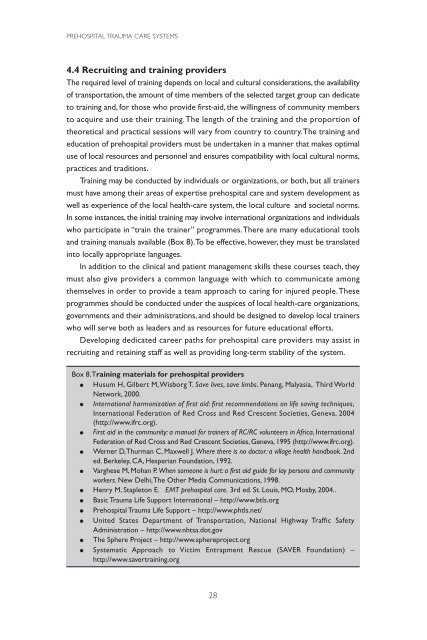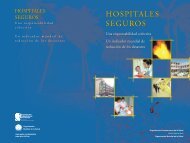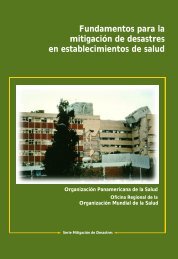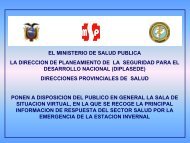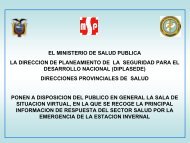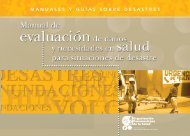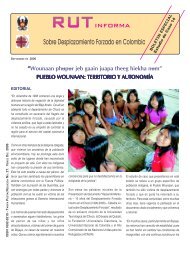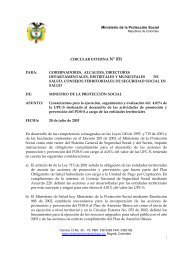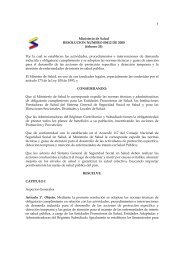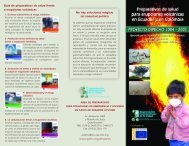Prehospital trauma care systems - World Health Organization
Prehospital trauma care systems - World Health Organization
Prehospital trauma care systems - World Health Organization
You also want an ePaper? Increase the reach of your titles
YUMPU automatically turns print PDFs into web optimized ePapers that Google loves.
PREHOSPITAL TRAUMA CARE SYSTEMS<br />
4.4 Recruiting and training providers<br />
The required level of training depends on local and cultural considerations, the availability<br />
of transportation, the amount of time members of the selected target group can dedicate<br />
to training and, for those who provide first-aid, the willingness of community members<br />
to acquire and use their training.The length of the training and the proportion of<br />
theoretical and practical sessions will vary from country to country.The training and<br />
education of prehospital providers must be undertaken in a manner that makes optimal<br />
use of local resources and personnel and ensures compatibility with local cultural norms,<br />
practices and traditions.<br />
Training may be conducted by individuals or organizations, or both, but all trainers<br />
must have among their areas of expertise prehospital <strong>care</strong> and system development as<br />
well as experience of the local health-<strong>care</strong> system, the local culture and societal norms.<br />
In some instances, the initial training may involve international organizations and individuals<br />
who participate in “train the trainer” programmes.There are many educational tools<br />
and training manuals available (Box 8).To be effective, however, they must be translated<br />
into locally appropriate languages.<br />
In addition to the clinical and patient management skills these courses teach, they<br />
must also give providers a common language with which to communicate among<br />
themselves in order to provide a team approach to caring for injured people.These<br />
programmes should be conducted under the auspices of local health-<strong>care</strong> organizations,<br />
governments and their administrations, and should be designed to develop local trainers<br />
who will serve both as leaders and as resources for future educational efforts.<br />
Developing dedicated <strong>care</strong>er paths for prehospital <strong>care</strong> providers may assist in<br />
recruiting and retaining staff as well as providing long-term stability of the system.<br />
Box 8.Training materials for prehospital providers<br />
● Husum H, Gilbert M,Wisborg T. Save lives, save limbs.Penang, Malyasia, Third <strong>World</strong><br />
Network, 2000.<br />
● International harmonization of first aid: first recommendations on life saving techniques,<br />
International Federation of Red Cross and Red Crescent Societies, Geneva, 2004<br />
(http://www.ifrc.org).<br />
● First aid in the community: a manual for trainers of RC/RC volunteers in Africa, International<br />
Federation of Red Cross and Red Crescent Societies, Geneva, 1995 (http://www.ifrc.org).<br />
● Werner D,Thurman C, Maxwell J. Where there is no doctor: a village health handbook. 2nd<br />
ed. Berkeley, CA, Hesperian Foundation, 1992.<br />
● Varghese M, Mohan P. When someone is hurt: a first aid guide for lay persons and community<br />
workers.New Delhi,The Other Media Communications, 1998.<br />
● Henry M, Stapleton E. EMT prehospital <strong>care</strong>. 3rd ed. St. Louis, MO, Mosby, 2004..<br />
● Basic Trauma Life Support International – http://www.btls.org<br />
● <strong>Prehospital</strong> Trauma Life Support – http://www.phtls.net/<br />
● United States Department of Transportation, National Highway Traffic Safety<br />
Administration – http://www.nhtsa.dot.gov<br />
● The Sphere Project – http://www.sphereproject.org<br />
● Systematic Approach to Victim Entrapment Rescue (SAVER Foundation) –<br />
http://www.savertraining.org<br />
28


